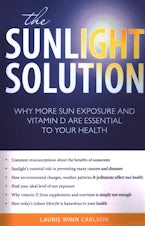
The Sunlight Solution
Why More Sun Exposure and Vitamin D are Essential to Your Health
Published by: Globe Pequot
246 Pages, 6.07 x 8.73 x 0.56 in
Other Retailers:

Published by: Globe Pequot
246 Pages, 6.07 x 8.73 x 0.56 in
Other Retailers: